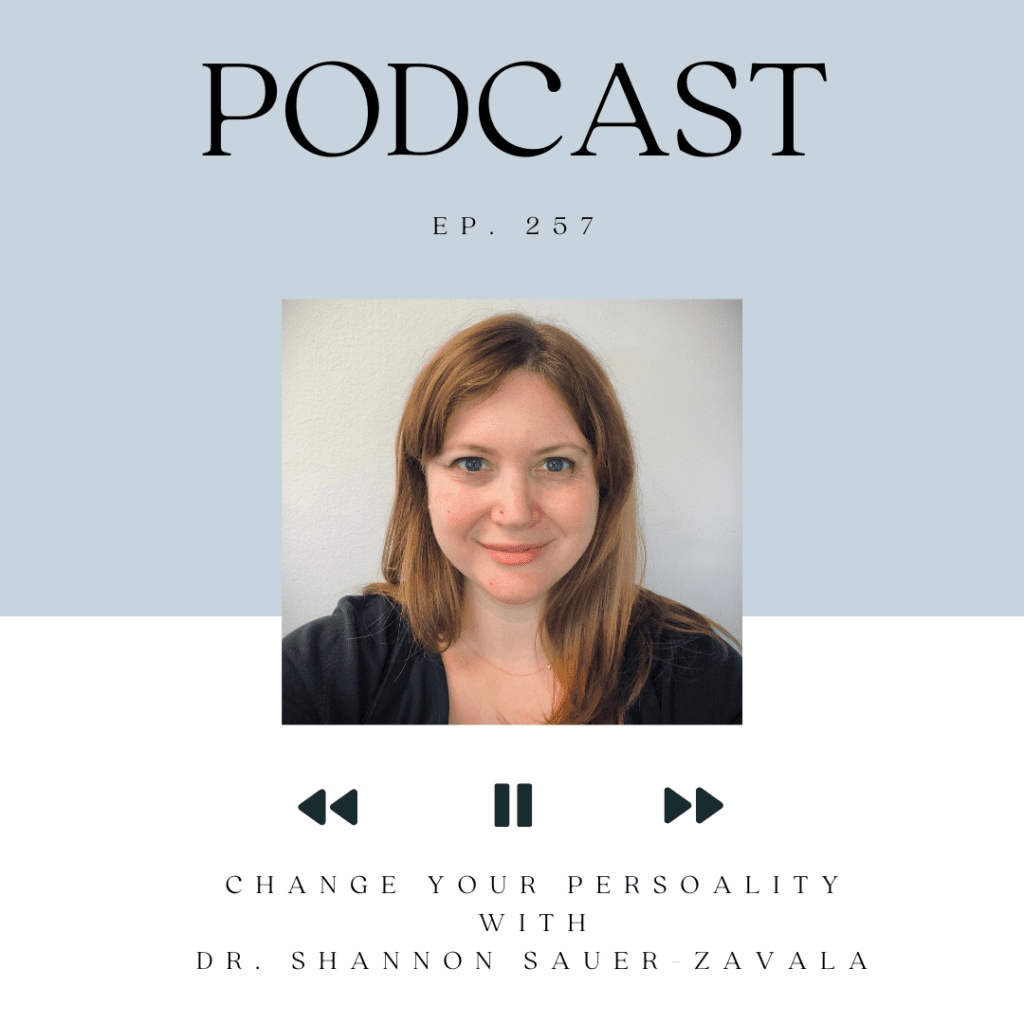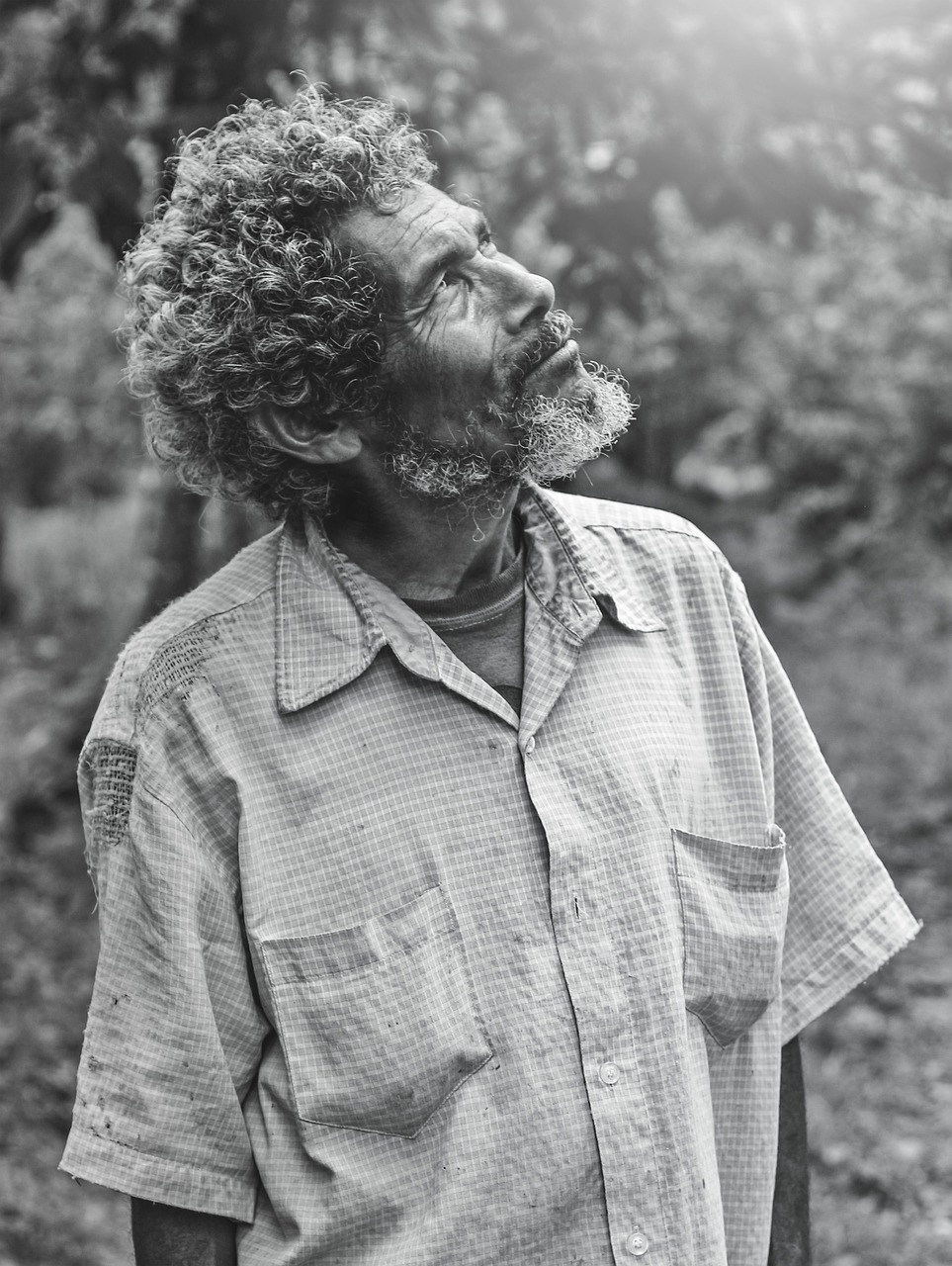Did you ever think it was actually possible to change your personality? Well let me tell you it is.
Dr. Shannon Sauer-Zavala, a clinical psychologist and academic researcher, discusses the potential for personality change and its impact on mental health. She explains that personality traits are not fixed and can be influenced by various factors. Dr. Zavala emphasizes the importance of matching therapy to the specific problem and highlights the need for accessible and evidence-based treatments.

She also critiques commercial personality tests and encourages individuals to focus on their goals and values when considering personal growth. Overall, Dr. Zavala’s work aims to improve the accessibility and effectiveness of mental health treatments.

Takeaways On Changing Your Personality
- Personality traits are not fixed and can change over time.
- Therapy should be matched to the specific problem and goals of the individual.
- Commercial personality tests may not accurately reflect personality or predict career success.
- The future of mental health research lies in improving accessibility and leveraging technology.
- Finding hope in difficult times involves recognizing the temporary nature of negative states and taking small steps towards positive change.
Sue (00:01.889)
Hi there today on the show we have got Dr. Shannon Sauer-Zavala here with us. I am so honored and delighted to have you here. Welcome to the show.
Shannon Sauer-Zavala (00:12.034)
Thank you so much, it’s such a pleasure to be here.
Sue (00:15.193)
I am so excited to have you here and get into the remarkable work you do. So you are a clinical psychologist, academic researcher. You have dedicated your career to developing psychological treatments to help people recover from mental health difficulties. And one of the really cool things you do is personality, like the fact that the personality can change. So I want to get more into that.
with you, I just think that’s so fascinating. But give us the backstory, how and why you got into this line of work in this field.
Shannon Sauer-Zavala (00:51.438)
Sure, sure. Yeah, so I am a kind of an empathetic person. I’m a big feeler. And I knew in my career, I wanted to do something that would help people. And I wasn’t necessarily sure what. At the same time, I was also kind of not super conscientious, not super ambitious necessarily when I was younger. And so didn’t have a ton of direction.
And my freshman year of college, my TA for my Intro to Psych class was like, you know, you should really consider majoring in psychology. And I was like, cool, sure. And so I did. And then really kind of like realized that this field was kind of my ticket to help people. So I kind of like chanced into it, I guess.
And then as I kind of moved through my studies, my training, realizing, you can help people one-on-one as a therapist, and then as a researcher, may take a little bit longer, right? But that you have the potential to move the needle on the quality of treatments that are being provided, the accessibility of treatment.
And that’s really what my research is about, trying to make treatment more accessible so that folks, if you’ve ever tried to seek psychological services, it can be really hard to find a provider. And so I’m trying to make treatment more efficient, more potent so that people can get in to be seen more quickly.
Sue (02:24.865)
Oh, wow. I just I love this. And now, you know, the mental health component, like because there’s so many different types of treatment or people you could be helping. But why mental health?
Shannon Sauer-Zavala (02:37.738)
Yeah, I think that like, mental health is an area that, that like, everybody has, right? You know, it’s on a continuum, right? From mental health and like flourishing to, you know, mental health difficulties, right? And so that’s a place where I think there’s a lot of, there’s a lot of room to grow and change across that continuum. And it is something that affects everybody and can affect anyone, you know, kind of
you can move along that continuum, anyone can, at any time, based on some of the things that are going on in people’s lives. So I think it’s just a really universal human thing that we deal with.
Sue (03:19.589)
Yes. And I love that it’s becoming kind of more universal, right? There’s less stigma around it. We’re having more conversations around it. And I love that we have experts like you coming out and sharing insights and expertise with us. That’s all so amazing. And now, so on this very note, I want to know, so you’ve been working on developing interventions that explicitly target the personality factors that put people at risk for mental health.
difficulties. Can you tell us what some of those are?
Shannon Sauer-Zavala (03:50.69)
Yeah, yeah, so to back up a little bit, like I said, my research is really focused on increasing accessibility and improving treatment. And the kind of status quo for how gold standard psychological treatment or cognitive behavioral therapy works.
is that there is a different kind of manual or protocol intervention or treatment for every disorder in the DSM, which is kind of like our big book of mental health conditions. And that is like way cumbersome for therapists in practice, right? Because like, you might, you know, your nine o’clock person might come in with depression, and your 10 o’clock might have PTSD, and your 11 o’clock might have panic disorder, right? And you’d have to do a different
kind of variation of treatment with each person. And when you are in a busy practice setting, particularly in more like community mental health centers, there really isn’t the prep time to be up to speed on all the different treatment iterations. And so a lot of times people, like therapists, will kind of fall back on how was your weak therapy. Come in, ask the patient how their week was.
and then try to sort of like infuse skills and strategies into like whatever the patient brings up. And so my interest in personality kind of comes from this place of wanting to simplify how treatment is delivered. And so there’s really good like basic psychopathology research that suggests that you can kind of account for
all the different individual mental health conditions by five dimensions of personality. Those are vulnerabilities to develop, say, anxiety or depression, eating disorder versus a substance use problem. Wouldn’t it be more efficient and simplified to treat the underlying vulnerabilities, these personality risk factors, rather than play whack-a-mole with the different symptoms?
Shannon Sauer-Zavala (06:02.338)
So that’s kind of the idea behind targeting personality. And you know, personality is really interesting. Like when we think about personality, we can be like really precious about it and we can sort of be like, oh, it’s the thing that’s my tastes or my sense of humor or my values. And that’s not what I think of when I think of personality. So basically.
As early as like the 1930s, a bunch of psychologists basically poured over the dictionary and pulled out any words that described people, human nature, and then kind of collapsed them into like as few categories as they would sort of fit into. And what they ended up with was five kind of broad domains of personality, our tendency to experience negative emotions or neuroticism, our tendency to be like excitable and sociable extroversion.
our tendency to get along well with other people, agreeableness, our tendency to be conscientious, reliable, conscientiousness, and then our tendency to be open to aesthetics and new ideas.
Sue (07:12.349)
Wow. And now, so give us, you know, we never, we don’t understand or ever consider personality in this way, that all of those different things that we’re doing, like this, you know, you don’t think of that as a personality trait. You know, a lot of times it’s like, hey, I’m a really social person. I like getting along or I easily get along with people. I’m an extrovert, but you don’t, you just think you’re an extrovert. You don’t think that that’s a trait
morphed or changed or developed. So give us some of those insights. Because I was just, when I was reading your bio, like, wow, you can change personality. I’ve never really heard that before. So how does that work?
Shannon Sauer-Zavala (07:54.25)
Yeah, yeah. So I sort of described personality as these kind of five different broad overarching traits, but then you could kind of like take it a step further, simplify it further. So personality is your characteristic way of thinking and behaving, right? So when you think, when you fill out a personality quiz online, right, they’re asking you like, do you generally get angry when people cut you off in traffic? You know, so you’re basically writing
you’re filling out the questions in response to how you generally think and behave. And again, we don’t think about personality as like a thing that changes, but we change our perspective all the time. We change our minds, we change how we view the world based on experience, and we change our behavior. We develop new habits. We, um, yeah, I mean, and so when you think about personality as your characteristic way of thinking and behaving, then yeah, then it seems a little bit more changeable.
Sue (08:48.565)
Mm-hmm. And so that’s kind of like the, see, this is so interesting because people who are considered themselves shy or introverts, they can’t imagine being any other way. They’re like, how would I just all of a sudden feel super social in a big social setting? So it’s kind of it’s like that CBT where that’s behavioral stuff that you’re changing. So can you give us some?
pointers on just a hypothetical scenario like someone who is an introvert, but would like to feel more comfortable and be more outgoing or outwardly social.
Shannon Sauer-Zavala (09:24.97)
Yeah, yeah, absolutely. And so the first thing that kind of comes to play are your goals and your values, because putting yourself outside of your comfort zone to push yourself to behave and think in different ways, like that’s really hard work. And if you are introverted and that suits you just fine because you’re not looking to get the next promotion or you’re not looking to be like a comedian or whatever, then…
then it’s not really necessary to go through the steps to shift your personality. And so one thing I want to be clear about is that like, I don’t think being extroverted is better than being introverted. I don’t think there’s like an optimal or right level of any trait. It’s like, what, what are your goals and values and what are the traits that are going to get you there? Um, and once you identified that, right, then there are some evidence-based strategies that you can use to nudge your personality. And if you are like kind of at the,
the bottom of the continuum in terms of extroversion, so you’re very introverted, you’re not gonna probably be the life of the party, but you might be able to nudge that a little bit so that you can be more functional potentially like working on a team in your office or something like that. And so the two things that I think about when we’re talking about personality change are how we think, right? And typically this is like identity kind of stuff. So if you tell yourself,
I’m an introvert, so I just don’t like people, or I just need, I couldn’t possibly do that, right? That’s gonna affect how you behave, right? I mean, I see this all the time with college students that I work with where it’s like, oh, I just need the adrenaline of the last minute before I can start studying. And it’s like, no, you don’t. You don’t literally need the adrenaline of the last minute to study for your exam, but that’s something that you’re telling yourself.
And so how we view ourselves can really affect whether or not we try different behaviors, right? So we kind of work on our perceptions of ourselves. And then the bigger piece really is changing your behavior. So, you know, if you are introverted or you’re more socially anxious, right? Like one of the things that you can do is put yourself in situations where you are…
Shannon Sauer-Zavala (11:46.118)
moving towards your values. So like, let’s say you’re introverted, but you really, you know, you really want to… I don’t know what’s a good example. You are really civically minded and you want to run for office, right? Because like you feel like you have some good ideas, but you’re really nervous about that, right? So how do you… maybe going from like giving a speech in front of, you know, a thousand people…
from being really introverted, that’s like too big of a leap. So like, what’s a baby step that you can take, right? Where you might maybe have some friends over and kind of talk about some of your talking points and probably you will be anxious, but you kind of see how that goes and if you get good feedback. And basically like, we’re all really attuned to reinforcement. So if something goes well and it gets reinforced, right? Something good happens after people are like, good job. Then we’re likely to do it again.
And when we do it again, if that gets reinforced, we’re likely to do it again after that. And so to kind of boil it down, it’s noticing if we’re having any self-limiting beliefs around who we are and what we can do. If so, then kind of trying out different behaviors that push the envelope a little bit, and then really paying attention to the results or the consequences or the outcomes.
Was there a reward for it to really lean into that because that’s gonna motivate you to do it again next time. And if you maintain these changes over time, you’re gonna be filling out those personality questionnaires differently, right? So instead of saying strongly disagree to I like speaking in front of people, you might say just disagree, or maybe you’ll say neutral, right? So you can see how that would change over time.
Sue (13:39.029)
Oh, wow, this is so neat. And you know this idea, because I always believed that people can change. Like, it just, it irks me, being really candid here, when people say, oh, people don’t change. But I think ultimately it’s like free will, right? Like you’re saying, personality is not set in stone. If you wanna change some aspect of yourself.
it can be done. You’re not just like, oh, you were born an introvert and you got to stay that way, or you were born whatever personality trait that is. Like, it’s fine and no judgment here if you want to be introverted, but if you want to be more out there, it’s possible to change. I just, I love that. And now, you know, talk to us about some of these. I know there was something I read in your bio about Myers-Briggs. So what is the deal with that? That’s kind of like a really
Give us the backstory on that. Oh, okay.
Shannon Sauer-Zavala (14:36.962)
Yeah, yeah, so a lot of the commercially available personality tests that are kind of used by corporations or used by schools to funnel people into their ideal roles, they’re like, they’re really face valid. And so what that means is that like, when you put your information into them, you respond to the questions, you get back a result that’s like reflects what you put in, right? So so like, when I take the Myers-Briggs, I am, I don’t know what the
the letters are, but it’s the summary word is the protagonist. And I’m like, yeah, that checks out for me. Yep. And so people really like it because, you know, we’re looking at uncertain times. And so it can be really nice to sort of get that validation. Oh, yes, I am who I thought I was. However, there isn’t a ton of research on whether or not these certain types predict career success, right? So it seems kind of weird to me that we
are really using this in the corporate space. And then I think the other issue is the point that you were making around, well, can people change? And my worry is that personality tests assume that personality is static. This is your type, and so you better make the best of it. Let’s find some jobs that would fit you. And so I think that is really limiting, right? And I would much rather let people
identify what they want to do in their lives, who they want to be, and then intentionally take steps to develop or cultivate those traits, rather than letting a personality test dictate or limit what you can become.
Sue (16:17.501)
Mm-hmm. And why was this, so this model, it seems like it’s slowly changing, right? And now we’re kind of giving people a deeper insight into what is possible versus our limited understanding as the field is evil.
Shannon Sauer-Zavala (16:37.186)
Yeah, yeah. So I think that like, academic sort of like pursuits and particularly personality science really needs to hire like a PR person because I mean, I feel like neuroticism, extroversion, conscientiousness, agreeableness, and openness doesn’t really compare to like, you’re a protagonist, you know, you’re a, you’re a
you know, a sage, right? Like, so I think when we think about trans, like science communication and how we translate these findings, I mean, when you look at, um, when you look at, like, scientific findings on personality, looking at, I mean, we call it the big five, which because we’re really creative academics, but those five personality traits that like, there’s pretty overwhelming evidence that they do shift across the lifespan that people change. Um,
But that type of research isn’t being done with some of these commercially available tests like Enneagram or Myers-Briggs because they’re not academic. They weren’t developed academically. They were developed as part of a business model.
Sue (17:42.946)
And this idea that people change over time, so that’s, so does that kind of, it applies to everyone really, like as you age and have different circumstances and different things come up, we all do really change in some way or another.
Shannon Sauer-Zavala (17:59.306)
Yeah, yeah, absolutely. So like, like I said, most people, so on average, right, people, like the population gets less neurotic, more extroverted, more conscientious, more open, and more agreeable over time. But there’s so much variability. So some people change a ton, and some people don’t, right? And I think it’s like, what are the motivators? Like what…
because you know I think to your point like some people will say like well people can’t change you know it’s just a tiger can’t change his stripes um but uh but I think people do change if there is like the right motivator or right incentive right reward right and that could be like realizing oh my gosh like my if I don’t
change this aspect of myself or how I’m relating to other people, like I’m going to lose my marriage, right? That could be enough to send somebody to therapy to figure out how to make these changes, right? Whereas some people might be like, it’s too hard to think about changing I’m not going to.
Sue (19:12.493)
Mm-hmm. Or like the, let’s say the really rigid or stubborn person who’s aging and things are happening in life, but they are resisting and aren’t conscientious to that in a kind of more, you know, bringing a lot of awareness to that, right? So instead of changing in a more powerful way or becoming more agreeable, they become more stubborn. So they’ve still changed.
but not necessarily for the better. And no judgment here, but just, you know, as we’re having this conversation.
Shannon Sauer-Zavala (19:49.046)
from the place of like people don’t do things for no reason, that it’s functioning in some way. So like with aggrievedness, you know, kind of the low end of that is like mistrust and antagonism. And we think about antagonism, like, gosh, that sounds bad. But like, a lot of people that are like not really trusting, and that might be more antagonistic have histories where they’ve been hurt in the past. And so like, people
do things to protect themselves, right, to feel safe. And so, um, you know, sometimes you could have a sort of restorative relationship where you learn, oh, like you kind of rewrite that narrative, like, oh, like people can be trusted, look at this. And then sometimes you have
an experience that’s really negative that kind of confirms or entrenches you in that belief that people can’t be trusted, right? So you can see how these life experiences could shift people along that continuum.
Sue (20:49.721)
Mm-hmm. And, you know, it’s so interesting now that we’re, because we on the outside world, those of us who aren’t psychologists or therapists or, you know, clinically like dialed into this, agreeable, being agreeable, that sounds like a positive quality, but, you know, really, if you’ve ever dealt with somebody who’s maybe too agreeable to the detriment of others,
Shannon Sauer-Zavala (21:08.844)
Hmm?
Sue (21:19.518)
It can be a really, really negative thing.
Shannon Sauer-Zavala (21:23.038)
Yeah. Yeah, right. And that’s why I think there’s like, no, there isn’t really an optimal level, right? We think of antagonism as being like a bad thing and agreeableness as being a good thing. But like, if you’re too agreeable, then you’re a doormat, right? There’s a reason people are always asking you to help them move. It’s because you always say yes, right? Or to the point where it could be like, it could even go past that and be like alienating to others where it’s just like…
Sue (21:24.909)
So.
Shannon Sauer-Zavala (21:51.622)
Like, have an opinion about this. Like, you pick the restaurant. Or whatever.
Sue (21:55.829)
Right. And so what it and I know there’s a myriad of things, right, that could be, but so the agreeable person is just is afraid of conflict or I mean, so many different things that why they’re agreeing or they’re insecure or they don’t, they’re not self assured in their own voice or opinion, or it just goes on and on.
Shannon Sauer-Zavala (22:22.718)
Yeah, right. So like on the antagonism side, it’s like, I’m going to put up a wall so you can’t hurt me. And on the like, too far on the agreeable side, it’s like, I’m just going to do everything possible to like, just be like you and do what you do and, you know, agree to everything you say, because I’m trying to protect myself.
so that you won’t leave, right? Or that you’ll like me, or that we won’t have an argument, right? So it’s sort of like two sides of the same coin, really.
Sue (22:57.053)
This is so interesting and you know I’ve seen this where it is, I mean being like someone, like mimicking what they do, which I guess is kind of almost an extreme case of being agreeable right? Where it’s like you’re so afraid of this person not liking you that you want to mirror them.
Shannon Sauer-Zavala (23:17.954)
Yeah.
Sue (23:20.001)
Wow, how fascinating is this? Now give us, so for, you know, you said something interesting at the beginning about therapy, and I’m, I’m leaning more towards therapy. Now I went to therapy for years in my younger years. And then I kind of got to this place where it was like, okay, therapy doesn’t work. And now I’m back to, oh, it works for some people and no judgment here. But
You know, there is something, like you said, that style of therapy where it’s kind of like, okay, well, how was your week, right? And so it’s just this kind of talk therapy, but people aren’t really necessarily getting solutions. It’s just more, okay, I’m getting some stuff off my chest. Does that help? I mean, what does that do? Really, ultimately we need solutions when we’re going to therapy though, right?
Shannon Sauer-Zavala (24:15.402)
Yeah, so I guess the way that I think about this is like, there are different types of therapy for different types of problems, right? Like you wouldn’t go to a podiatrist if you needed help with your heart, right? And so, I think when people are, maybe have a lot going on in their lives and they need like an objective person that they can just reflect ideas off, right? Or they,
are, you know, just kind of want somebody, I mean, some people just like having a support system in that way. And so that is perfectly appropriate for supportive care. I think, though, that for some conditions, supportive care isn’t really the gold standard, right? So for instance,
If you are having panic attacks and you have panic disorder, supportive care is not going to cut it, right? There are really structured treatments that can help people not have panic disorder anymore after eight sessions. And so you want to make sure that the difficulty for which you’re seeking therapy is matched with what the provider is offering.
Sue (25:38.221)
Mm-hmm. And I think this idea where it’s like, okay, let’s say you’ve got a wound or something that you struggle with from your childhood or your past or someone’s betrayed you and you go to therapy for that. But if you’ve been going to therapy for a year, talking about it or two years or three years and it’s almost just kind of like reliving it without kind of…
healing or you know you’re keeping it alive in some sense right so that can be maybe not helpful.
Shannon Sauer-Zavala (26:14.838)
Right. And I think that like-
For people, I mean, I can speak about cognitive behavior therapy. That’s like my modality. And I think it’s great, probably because I do it. But one of the things I really like about CBT is it’s really present focused. So right, like if there was a hurt or a wound from the past, right, it’s less about like, well, let’s like continue to like unpack and process and talk about it. And it’s more like, well, how is that affecting you now? And
you know, how like, you know, if that trauma or hurt is at the root, like what are the branches of the tree that are sort of affecting you now? And then what are skills that we can use to, to help you cope, number one. And like potentially, you can, you can make changes to how you’re relating to other people without necessarily
like digging up or rehashing the hurt over and over again. Like I guess the example that I’m giving, like, I don’t know, like say like somebody, somebody’s partner cheated on them, right? There was infidelity in the relationship, just as an example. And you know, I think that it makes sense that, you know, when that person starts dating again, their guard is gonna be like super up, right? And it’s not necessarily helpful.
to keep reflecting on the fact that you got cheated on in the past. But what is more helpful is to think about, well, how is that affecting your relationship now? You’re gone on a couple dates with this person and you think you might like them, but you’re noticing that you’re sending a lot of reassurance-seeking texts, or you’re not talking about certain things that make you feel vulnerable with that person. You’re holding some of yourself.
Shannon Sauer-Zavala (28:14.846)
right? Like, oh, I don’t want to get hurt again. And so we look at the behaviors that we’re engaging in right now that reinforce the belief that like bad things are going to happen because they happen in the past. And then we ask people to try to do something different, you know, change your behavior and see what happens. And then when you know, say that new person that you’re dating turns out not to be a person that’s going to hurt you, then you learn and you can grow.
Sue (28:43.269)
I love that. That’s such great guidance there. Now, what about, you know, if you have someone, I get this all the time, I have this conversation with different people, you know, where we’re not always able to deal in the most optimal or most powerful way with a difficult person in our world or somebody that kind of makes you feel defensive or you’ve got to put your guard up because you don’t know what to anticipate. What
Is your guidance there? What’s a powerful way of approaching or being around in a scenario like that? Whether it’s a boss, a colleague, someone that’s always kind of putting you on edge.
Shannon Sauer-Zavala (29:25.674)
Yeah, yeah, I think it really depends on the situation, right? I don’t think there’s a hard and fast rule. And so I would want to talk to the particular person and understand like, how are they thinking about this and how are they behaving in this situation? But at the end of the day, when you’re talking about interpersonal situations, like you can’t control what another person does. And it doesn’t matter how skillful you are, how assertively you ask. Like doesn’t sometimes doesn’t matter what you do if the other person
hasn’t dealt with their own shit, basically. And so, what?
sometimes there is just a limit to like therapy skills. Like sometimes you can’t just think your way out of somebody is a jerk, right? Like, and so sometimes the most powerful thing is to drop the rope, like get, stop the power struggle with the person. You know what, like I’m not even engaging in this because it’s not reasonable.
Sue (30:25.333)
Right. Yeah. And it’s it really and you don’t know what to expect, you know, and it is every scenario is so different. And that being caught off guard can really you never know when it’s going to happen.
Shannon Sauer-Zavala (30:40.498)
And that’s anxiety-provoking, right? Uncertainty is like the biggest driver of anxiety.
Sue (30:45.965)
Mm-hmm. And now tell us, you know, for people who are stuck and struggling, someone’s feeling really kind of down and out, hopeless. What is, you know, if you just had a piece of advice, like if you were talking to a friend, I know you’re a psychologist, so, but what is that advice you would give someone who’s just kind of like really doesn’t see any hope?
Shannon Sauer-Zavala (31:13.386)
Yeah, yeah, I think the biggest piece of advice I would probably give is that a lot of these states are temporary. And so if there’s a time when you felt hopeful before, or if there is a time when you felt differently than this, right, or if you felt hopeless before, and you know, it’s been kind of cyclical, you know that the like, this passes, right? And
I think that’s probably like the kind of the first thing I would say is that, you know, we all have periods of time like this and they do fluctuate for us. And so to really lean into kind of the temporary nature of these things and then, you know, going from there, thinking about like what are, what is like a very, very small thing you could do today that would take you in the direction that you would ideally want to go.
And for some people, if you’re really depressed, that’s take a shower, or it’s get up and change your pants. Or if you’re feeling stuck in your career, but maybe you’re not super depressed, maybe it’s work on your resume. But just figure out what is the next step.
Sue (32:31.405)
Oh, I love that. And now, what is next in the mental health field in terms of research? What’s upcoming? What should people, is there something people should be excited about in terms of treatments or things like that? I know that’s such a huge broad question, but
Shannon Sauer-Zavala (32:48.662)
Yeah. So I think really importantly in terms of like behavioral treatment, like therapy, is that we really do know what works. We’ve been studying treatment for common mental health conditions for 60 years. So we actually have really good treatments, treatments that like when people come into clinical trials and they get these like high quality treatments, like
85% of people no longer have the condition at the end of 12 weeks. So we have really good treatments. I think what we really need to be focusing on and I think where the field is going is thinking about accessibility, thinking about dissemination, like how do we get these treatments that we know work into the hands of people that need them? And I think some of that is simplifying our system of delivering care so that…
so that clinicians have an easier job providing evidence-based practice. I think it’s thinking big about prevention, right? Because it’s like cognitive behavioral therapy skills are like not, I mean, they’re not like a magic thing that like only a therapist could provide, right? Like you could, kids learn these skills in school so that they’re less likely to have some of these difficulties.
And then I think leveraging technology, because at the end of the day, there’ll never be enough therapists to meet the demand for the point that you were making earlier, that we’re a lot more comfortable talking about mental health, so people seek therapy at higher rates. And so, are there ways that we can leverage technology to help people get the skills or the tools that they need?
Sue (34:27.845)
And now, you know, I know as a psychologist and a therapist and all of that, you’re not really supposed to, you know, advise or give this sort of information, but is there a place online or like a website or something you recommend for people who maybe don’t have health insurance or coverage and need some sort of mental health tools or resources?
Shannon Sauer-Zavala (34:53.118)
Yeah, yeah. So the Association for Behavioral and Cognitive Therapy, it’s abct.org, has resources online and has kind of a referral list of people that are going to be providing this really good, high quality care. I mean, not to plug my own stuff, but like on my website, which is
Shannon Sauer-Zavala (35:19.49)
Give away workbooks, they’re free downloads for worksheets and workbooks for this very reason, I think that mental health care shouldn’t be a luxury. So people are welcome to go to my site and access any of that.
Sue (35:33.721)
Awesome, and I’ll be sure to have a link to your site for people as well. And now, you know, with your research, what are you working on? Are there things, what’s upcoming for you in the coming this year and beyond?
Shannon Sauer-Zavala (35:46.718)
Yeah, yeah. So, so right now I am working on a treatment for borderline personality disorder. One of the reasons I really like working with this condition is that like, I think it’s unfairly stigmatized and is the folks with BPD respond really well to high quality treatment. And as of yet, most of like most of the treatments for this condition are very intensive year long treatment. And so if you don’t have a lot of money or you don’t live in a big city, it’s really hard.
And so I’ve been really trying to make a more sort of streamlined kind of traditional like, you know, 50 minute outpatient session protocol for folks with BPD. And we’ve been having really good success treating folks in our trial. And it is really based on this personality change module. So helping people feel fewer negative emotions, helping them trust more and helping them be less impulsive.
And the next step with that is to try to personalize it based on the personality difficulties that people are coming in with. So they might not get all three modules, they might just get like the neuroticism module if that’s where they’re really struggling.
Sue (36:56.645)
Oh, I love that. Well, wow, this has been so amazing. Dr. Shannon, you have been so insightful. You’ve offered so much practical guidance and insights for people. I think people are gonna have so many takeaways from what you’ve shared. So first and foremost, just wanting to thank you for your time today.
Shannon Sauer-Zavala (37:17.258)
Yeah, yeah, thank you so much. I mean, when I saw a podcast called blossom, you’re awesome. I was like, I want to be on that
Sue (37:25.673)
I love that. Well, you definitely aided in that and helped us learn that we can change our personalities. We don’t have to be, they’re not set in stone. So that definitely helps us blossom our awesome. You were wonderful. Now in closing, you’ve already said so many amazing things, but if there were just one message or hope for everybody, what is that closing message?
Shannon Sauer-Zavala (37:49.386)
Yeah, don’t let a personality test tell you who you are or what you can become.
Yeah, I’ll just leave it at that.
Sue (38:01.445)
I love that. That just is such a powerful message. You’ve been so wonderful. Thank you so much. Thank you.
Shannon Sauer-Zavala (38:07.182)
My pleasure, thank you.
Chapters
00:00 Introduction and Background
00:44 Interest in Personality and Mental Health
07:12 Understanding Personality Traits
08:48 Changing Personality Traits
09:15 Changing from Introverted to Extroverted
13:39 Advice for Changing Personality Traits
14:34 Critique of Commercial Personality Tests
16:37 The Changing Perception of Personality
19:49 Understanding Personality Change
20:49 Factors Influencing Personality Change
21:23 The Complexity of Agreeableness and Antagonism
23:47 The Limitations of Talk Therapy
25:38 Matching Therapy to the Problem
28:43 Dealing with Difficult People
31:13 Finding Hope in Difficult Times
32:48 The Future of Mental Health Research
34:53 Online Resources for Mental Health
35:46 Current Research on Borderline Personality Disorder
37:17 Closing Message
To see more of the Blossom Your Awesome Podcast click here.



































































































































































































































































